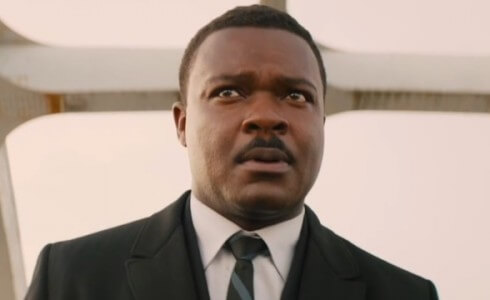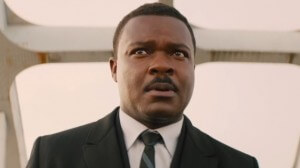Movie a Day Blog was surprised to discover when posting about UNBROKEN (2014, Movie a Day 1/12/15) that somehow I had failed to write my thoughts about SELMA (2014, Theatrical), an important and well-made film that deserves serious attention.
Timing is everything in the movie business, and at first it seemed that SELMA’s couldn’t be better, coming out just after the Ferguson, MO and New York City protests over police violence against black men.
SELMA shows the Southern origins of this racism as typified by a series of marches in a small Alabama city that lives with this heritage to this day, as Ferguson probably will also.
It seems the movie isn’t really catching on, which could be racial fatigue, but could also be indicative of why I wasn’t passionate enough about SELMA to remember to write about it.
Ava DuVernay, a talented and smart black director with whom I shared a panel discussion a few years ago at the RiverRun International Film Festival, has crafted a stirring and expansive history of the American civil rights movement as typified in the one-event focus of her film. It’s a clever and effective way to tell a broader story, and the drama is straight out of history, rendered suspenseful and intense in DuVernay’s capable hands.
But something still seems missing, although that may solely be the experience of a 60-plus-year-old white Jewish male; a black audience might well have a distinctly different viewing perspective.
David Oyelowo is masterful as Martin Luther King, Jr., adapating his native British accent to the lush Southern cadences of King’s everyday and speaking voices. Oyelowo also captures the preternatural calm King usually exhibited in public, a kind of divine grace that always reminded me of Mahatma Ghandi, who also espoused non-violent protest and in the process managed to free India from British colonialism.
King was no saint, as J. Edgar Hoover spent a good part of his latter career detailing, and SELMA deals with that reality and his sometimes-uncomfortable relationship with his wife Coretta Scott King. Oyelowo doesn’t look exactly guilty, but neither does he come off as holier-than-thou. It’s a performance of depth and feeling, and frankly, the single best element in SELMA.
The problem the movies faces in its concentration on King’s charisma and his manipulation of events in Selma is that everything and everyone else plays second fiddle to the “big theme.”
None of the other black civil rights leaders are given any depth or even enough characterization to tell them apart (I know how racist that sounds, but unfortunately for me, it was true). Wendell Pierce registers strongly as Rev. Hosea Williams, but that’s because of the strength of his acting, and not the script by Paul Webb and shaped by DuVernay.
Only Lyndon Johnson is given any substantial screen time and that has been the second biggest problem for SELMA. The Lyndon Johnson Fan Club has been up in arms by the movie’s implication that Johnson was the most reluctant of partners in the passage of the Civil Rights Voting Act; the film does show King pushing and Johnson resisting.
Yet Johnson comes off as a canny and effective politician, and someone willing to overlook his own background and personal feelings for the better good of the nation. To suggest that the march in Selma was his idea is, as DuVernay has publicly commented, jaw-dropping, and would have tarnished the movie for all the wrong reasons.
SELMA is still missing that ineffable something that takes a movie from very good to great. I can’t put my finger on exactly what that mysterious factor is in the context of this ambitious and highly-realized production. Still, don’t look for SELMA as a serious Best Picture contender. It doesn’t seem to be its year for the spotlight.



Comments are closed